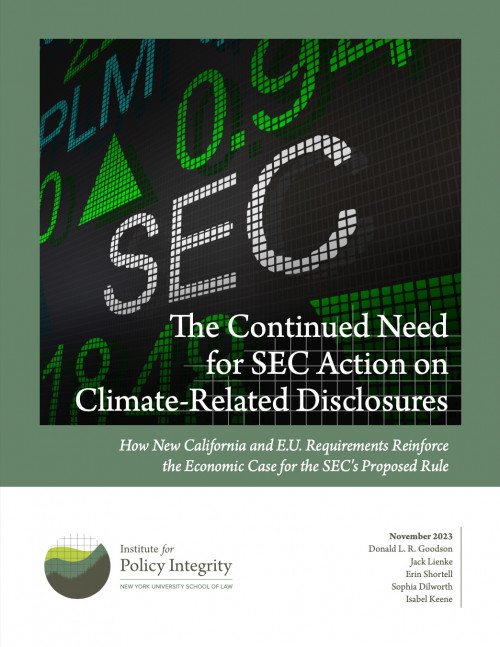On March 21, 2022, the Securities and Exchange Commission (SEC) proposed a rule that would require SEC registrants (both domestic and foreign) to provide climate-related disclosures in certain SEC filings (SEC Proposal). The SEC Proposal draws on the recommendations of the Task Force on Climate-Related Financial Disclosures (TCFD), which have become the leading climate-related disclosure framework around the world. The proposal’s primary benefits are increased consistency, comparability, and reliability of climate-related disclosures, which enable investors to make better-informed investment decisions.
Since the release of the SEC Proposal in March 2022, other jurisdictions, including California and the European Union, have adopted climate-related disclosure regimes. These new disclosure regimes are similar to the SEC Proposal in that all three largely align with the TCFD recommendations. Many of the entities subject to these new disclosure regimes would also be subject to the SEC Proposal.
Like many federal rules, the SEC Proposal included an assessment of its costs and benefits. This report examines how the California and E.U. disclosure regimes may affect the baseline for that cost-benefit analysis and, consequently, the SEC’s assessment of the incremental costs and benefits of its proposal. Overall, we find that the new disclosure regimes do not undermine the economic case for the SEC Proposal; if anything, they bolster it.
Most notably, the SEC Proposal’s baseline analysis expressly anticipated that, independent of further SEC action, SEC registrants would increasingly be subject to TCFD-aligned disclosure requirements in other jurisdictions, much like the new California and E.U. disclosure regimes. Of course, this does not mean that the new regimes have no effect on the incremental costs and benefits of the SEC Proposal. Many (but not all) SEC registrants are subject to the new California and E.U. disclosure regimes. Because the SEC Proposal is substantially similar to these regimes (as well as other foreign TCFD-aligned disclosure regimes), such registrants will now face a substantially lower cost of compliance with the SEC Proposal. But applying the SEC Proposal to all SEC registrants will still yield significant incremental benefits for investors. The purpose of the SEC Proposal is to ensure not just that all registrants disclose their climate-related financial risks but that they do so in a consistent format that enables investors to easily compare risk across companies. Because not all SEC registrants are subject to the California and E.U. disclosure regimes, finalizing the SEC Proposal will still increase the comparability and consistency of climate-related disclosures relative to the baseline. In addition, while disclosure on company websites suffices for compliance with the California regime, the SEC Proposal requires disclosure in more formal SEC filings that presumably receive heightened attention from registrants. Accordingly, the SEC Proposal will still enhance the reliability of disclosures.

